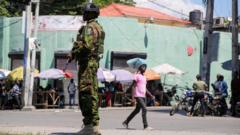Haiti has become the epicenter of escalating gang violence, with recent reports indicating the shocking murders of at least 110 mainly elderly individuals allegedly accused of practicing witchcraft. This brutality was initiated after a gang leader's son succumbed to an unidentified illness, prompting the leader to consult a voodoo priest, who blamed local elderly residents for the child's misfortunes. This incident underscores the troubling blend of superstition and violence in the country.
According to the National Human Rights Defence Network (RNDDH), the horrific killings were concentrated in the Cité Soleil neighborhood, where gang members abducted vulnerable individuals from their homes. Eyewitnesses relayed distressing accounts of gang members employing firearms and knives on their victims, with many bodies later being mutilated and burned in public areas. The UN's human rights chief, Volker Türk, highlighted that this recent spate of violence has contributed to a staggering total of 5,000 killings in Haiti for the year thus far.
The massacre began over the weekend, with RNDDH reporting that approximately 60 elderly people were slain on Friday, followed by another 50 on Saturday. Local media suggested that individuals attempting to defend the elderly were also targeted. Monel Felix, known as Mikano and the leader of the local gang, has been identified as the orchestrator of this violence, capitalizing on the prevailing atmosphere of fear and lawlessness. His gang is a part of the larger Viv Ansanm alliance, notorious for controlling much of Haiti's capital and increasingly expanding their reign of terror into surrounding regions.
Haiti's gang violence has surged since the assassination of President Jovenel Moïse in 2021, leading to an environment where ordinary residents often bear the brunt of the bloodshed. While prior data indicated a temporary decline in violence, the situation has rapidly deteriorated, exemplified by the massacre in Pont-Sondé, where 115 locals were killed just weeks prior.
The rise of gang dominance, controlling as much as 85% of Port-au-Prince and extending into the countryside, has forced over 700,000 individuals—including many children—to abandon their homes. Additionally, sexual violence is being weaponized as a tool of intimidation and control within vulnerable communities.
International intervention efforts, particularly a Kenyan-led police force, have proven ineffective against the heavily armed gangs, further exacerbating the humanitarian crisis. Meanwhile, the Transitional Presidential Council, established purportedly to restore order and organize elections, remains embroiled in its own chaotic struggles, leaving hopes for stability and a return to democracy in Haiti distant.



















